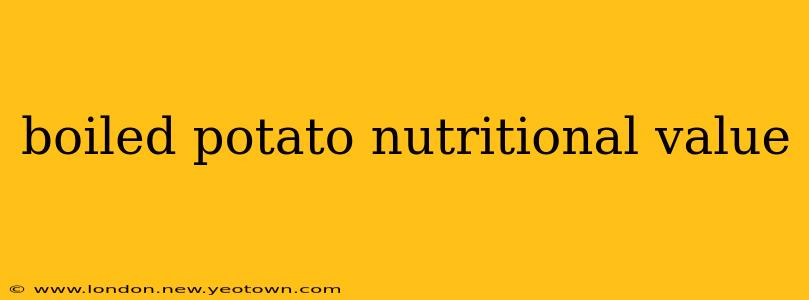The humble boiled potato. Often overlooked in the quest for the "perfect" healthy meal, this simple starch deserves a closer look. Far from being a dietary villain, the boiled potato offers a surprisingly impressive nutritional profile, packed with essential vitamins, minerals, and fiber. Let's peel back the layers (pun intended!) and uncover why this everyday food deserves a place on your plate.
My grandmother, a woman who knew the value of simple, wholesome food, always had a pot of boiled potatoes simmering on the stove. She'd serve them alongside a simple salad, a hearty stew, or just with a pat of butter – and it was always a comforting, satisfying meal. It was only later, when I delved deeper into nutrition, that I truly understood the wisdom behind her culinary staple.
What are the Nutritional Benefits of Boiled Potatoes?
A medium-sized boiled potato (about 5.3 ounces or 150 grams) provides a significant amount of essential nutrients. These include:
- Vitamin C: A crucial antioxidant that supports your immune system.
- Potassium: Important for maintaining healthy blood pressure.
- Vitamin B6: Essential for brain development and function.
- Manganese: Plays a role in bone health and metabolism.
- Fiber: Promotes healthy digestion and keeps you feeling full.
- Iron: Essential for carrying oxygen throughout your body.
While the exact nutritional content can vary based on factors like the potato variety and growing conditions, the boiled potato consistently delivers a good dose of these vital nutrients.
Are Boiled Potatoes Healthy?
Absolutely! The key to unlocking the health benefits of potatoes lies in how you prepare them. Boiling is a particularly healthy method, as it requires no added fats or oils. This makes it a much healthier option compared to frying, which drastically increases the calorie and fat content. The simple boiling process preserves many of the potato's valuable nutrients, making it a nutritious and versatile food.
How Many Calories are in a Boiled Potato?
A medium-sized boiled potato contains approximately 110-160 calories. However, this number can fluctuate depending on the size and variety of the potato. Adding butter, sour cream, or cheese, of course, significantly boosts the calorie count.
Are Boiled Potatoes Good for Weight Loss?
Boiled potatoes can be part of a healthy weight-loss diet. Their high fiber content contributes to satiety, helping you feel full and satisfied, which can help manage your calorie intake. However, portion control is key. Overindulging in even healthy foods can hinder weight loss efforts.
Are Boiled Potatoes Good for Diabetics?
Boiled potatoes have a moderate glycemic index (GI), meaning they don't cause a rapid spike in blood sugar levels. However, individuals with diabetes should still consume them in moderation and as part of a balanced meal plan, paying attention to portion size and combining them with other foods that have a low GI.
What are the Disadvantages of Eating Boiled Potatoes?
While generally healthy, some potential downsides of eating boiled potatoes include:
- Acrylamide Formation: High-temperature cooking methods like boiling can lead to the formation of acrylamide, a compound that some studies have linked to potential health risks. However, the levels of acrylamide in boiled potatoes are generally lower compared to fried or roasted potatoes.
- Potassium Content: Individuals with kidney problems should monitor their potassium intake, as potatoes are relatively high in potassium. Consult your doctor before making significant dietary changes.
Conclusion: Embrace the Humble Boiled Potato
The boiled potato, with its simple preparation and impressive nutritional profile, is a food that deserves a prominent place in a healthy and balanced diet. Remember to enjoy it in moderation, consider how you pair it with other foods, and listen to your body. My grandmother's wisdom holds true – sometimes, the simplest foods are the most nourishing.

